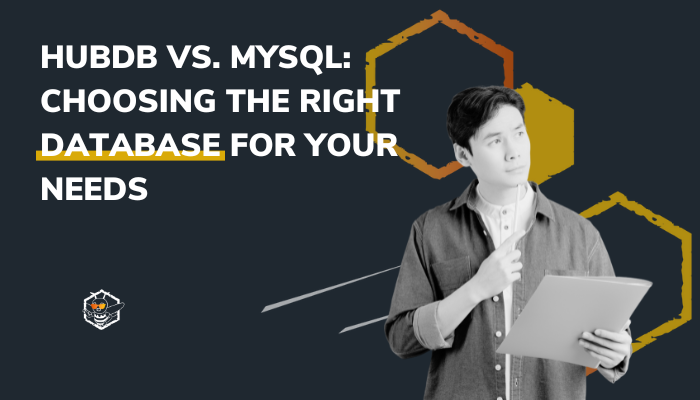When thinking about database management, two prominent platforms—MySQL and HubDB—stand out for their unique capabilities and features. Each has its strengths and ideal use cases, catering to different requirements in the realm of data management.
When comparing HubDB and MySQL, we're essentially looking at two different species within the database ecosystem. HubDB is typically known within the context of HubSpot, a popular CRM, marketing, sales, and service software, while MySQL is one of the most popular open-source relational database management systems. This article will explore the fundamental differences between these two systems in terms of design, use case, scalability, security, and community support.
Design and Structure
MySQL: MySQL is a relational database management system (RDBMS) based on SQL (Structured Query Language). It organizes data into tables and allows for complex queries, relationships, and transactions. MySQL is designed to handle large databases and is used in a wide variety of applications, from small personal projects to large-scale enterprise systems.
HubDB: HubDB is a proprietary database system designed by HubSpot. It is essentially a columnar database that allows users to create dynamic, web-based tables. Each table in HubDB is similar to a spreadsheet with rows and columns, and it's specially designed to manage website data within the HubSpot platform. It integrates tightly with HubSpot's website content management features, enabling marketers to update and manage website data more efficiently.
Use Case and Integration
MySQL: Due to its versatility and powerful features, MySQL finds its use in virtually every field that requires a reliable database system. It's commonly used in web applications, data warehousing, e-commerce, logging applications, and much more. Its widespread adoption is partly due to its compatibility with various platforms and programming languages.
HubDB: HubDB is specifically tailored for marketers and web developers using the HubSpot ecosystem. It's used to manage website data like blog posts, product listings, employee directories, and other dynamic content that might change regularly. HubDB tables can be easily integrated into HubSpot's website pages, blogs, and email templates, providing a seamless experience for managing and displaying data.
Scalability and Performance
MySQL: MySQL is highly scalable and can handle a large number of concurrent connections and large databases with many records. It's designed to meet the demands of mission-critical applications while ensuring data integrity and performance. Various optimization techniques and indexing are available to improve query performance.
HubDB: While HubDB is quite efficient within the HubSpot ecosystem, its scalability and performance are generally considered in the context of website management. It is not typically used for extremely large databases or applications outside the scope of content management. However, for its intended use in dynamic website content, it performs admirably and integrates well with other HubSpot services.
Security
MySQL: MySQL offers robust security features, including encrypted connections, granular privileges, and robust access control mechanisms. It is continuously updated to address security vulnerabilities and is widely regarded as a secure database solution.
HubDB: As part of the HubSpot platform, HubDB inherits the security measures provided by HubSpot, including regular audits, data encryption, and compliance with various security standards. Users benefit from the security features integrated into the overall HubSpot ecosystem.
Community and Support
MySQL: Being open-source, MySQL has a massive global community of developers and users. It benefits from extensive documentation, community-driven enhancements, and widespread support across various forums and professional services.
HubDB: HubDB's community is more niche, focused around HubSpot users and developers. While it might not have the vast ecosystem of MySQL, HubSpot provides comprehensive documentation, user guides, and professional support for its users.
In conclusion, while MySQL is a versatile, powerful, and widely-used RDBMS suitable for a variety of applications, HubDB is a specialized tool designed for managing dynamic web content within the HubSpot ecosystem. The choice between HubDB and MySQL ultimately depends on the specific needs, scale, and context of your project. MySQL is typically chosen for its robustness and flexibility across many applications, whereas HubDB is selected for its deep integration and ease of use within HubSpot-powered websites.
As you explore the possibilities, it's essential to align your decision with the goals and intricacies of your web development journey. If you're curious about how we tailor these solutions to create seamless and dynamic websites, delve deeper into our website development process to uncover the intricacies that drive success.



.png?width=100&height=100&name=HubSpot%20for%20K%E2%80%9312%20Education%20How%20Schools%20Use%20HubSpot%20to%20Improve%20Enrollment%20(and%20How%20to%20Set%20It%20Up).png)
.png?width=100&height=100&name=The%20Complete%20Guide%20to%20HubSpots%20Prospecting%20Agent%20(2025%20Edition).png)
